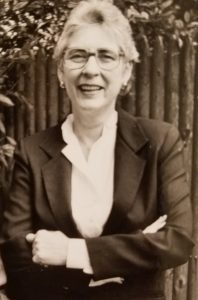Dr. Elizabeth C. “Betty” Mitchell Walter (MA 1969) died January 1, 2019. Walter was known as an artist, art educator, academic, administrator and author and served as professor and department chair for more than two decades at the University of North Alabama. But one of her most consequential roles was one that is least known: her contributions to civil rights work in Alabama in the 1960s and ‘70s.

The Freedom Quilting Bee
In 1965, Betty Walter and her husband, the Reverend Francis X. Walter, lived in Tuscaloosa while Rev. Walter served as the director of the Selma Inter-religious Project, documenting cases of voter harassment against African American residents of Wilcox County. It was during this time that the Walters helped residents in several area communities establish the groundbreaking quilting cooperative based in Alberta, Ala. – the Freedom Quilting Bee.1
Walter enrolled in graduate school in art at UA in 1966 and worked in what was then known as the University Art Gallery in Garland Hall under department chair Dr. Ted Klitzke. She also found time to make trips with her husband to the Black Belt to support the new quilting cooperative. Walter’s connection to the art department and the gallery would be crucial to the Freedom Quilting Bee’s early media attention.
The following year, the artist Lee Krasner, widow of Jackson Pollock and renowned in her own right as a painter, had a solo exhibition in the University Art Gallery, the inaugural show on the re-opening of the renovated gallery, Feb. 14 – March 14, 1967. Krasner met with art students, visited classes and was feted around Tuscaloosa, and Walter, as gallery coordinator, was with her much of the time.
During Krasner’s stay, the Walters showed her slides of the quilts being produced by the women of the Freedom Quilting Bee, and the artist asked to visit the co-op. Rev. Walter wrote, “To our great pleasure and surprise Miss Krasner postponed her return to New York to spend a day visiting officers and members of the co-op in Gees Bend.” She ended up buying four quilts.2
After Krasner’s visit, the Walters went on to produce a quilt auction in New York City. Through their own connections and Krasner’s, the event turned into a huge fundraising and media success, attracting artists, writers, activists and publications like Vogue and the New York Times. The auction put Wilcox County, Ala., and the Freedom Quilting Bee on the map and in the minds of people outside of the state and helped the co-op flourish. Read more about the Freedom Quilting Bee today.
First Tuscaloosa ACLU Chapter
During this time, Walter was also involved in other civil rights organizing. She was instrumental in the founding of the Tuscaloosa chapter of the American Civil Liberties Union, before the state’s chapter was founded, according to author and veteran civil rights activist Steve Suitts, founding director of the Alabama Civil Liberties Union.
Organizing for civil rights during this time could get a person – white or black – killed, or at least get a cross burned in your yard. Suitts said, “Publicly affiliating with the ACLU in the 1960s took guts.”
Civil rights lawyer Jack Drake remembers, “Betty was the mover and driving force for the founding of the first ACLU chapter in Alabama. It was formed on the University of Alabama campus in 1968-69.”
Suitts said that he got to know Walter and her husband when he was a staff member of the Selma Project. “She pursued what she thought was right with a no-nonsense determination that often seemed fueled by a real dedication to justice or by a deep anger about the unjust ways of the world.”
1 Nancy Callahan, The Freedom Quilting Bee (Tuscaloosa: University of Alabama Press, 2005).
2 Newsletter of the Selma-Interreligious Project (Tuscaloosa, Ala., Feb. 27, 1967), 1.
Further Reading
Ruth Appelhof, Lee and Me: An Intimate Portrait of Lee Krasner, Milan, Italy: Officina Libraria, 2019.
Rachel Dobson, “Exhibition Brings Back Alumni Memories of the Civil Rights Era,” Loupe, Spring 2012.
_________, “UA Art Chair Marched in First Selma-to-Montgomery Marches,” June 2015.
For more information about The University of Alabama’s programs in studio art and art history, visit our Degree Programs page.